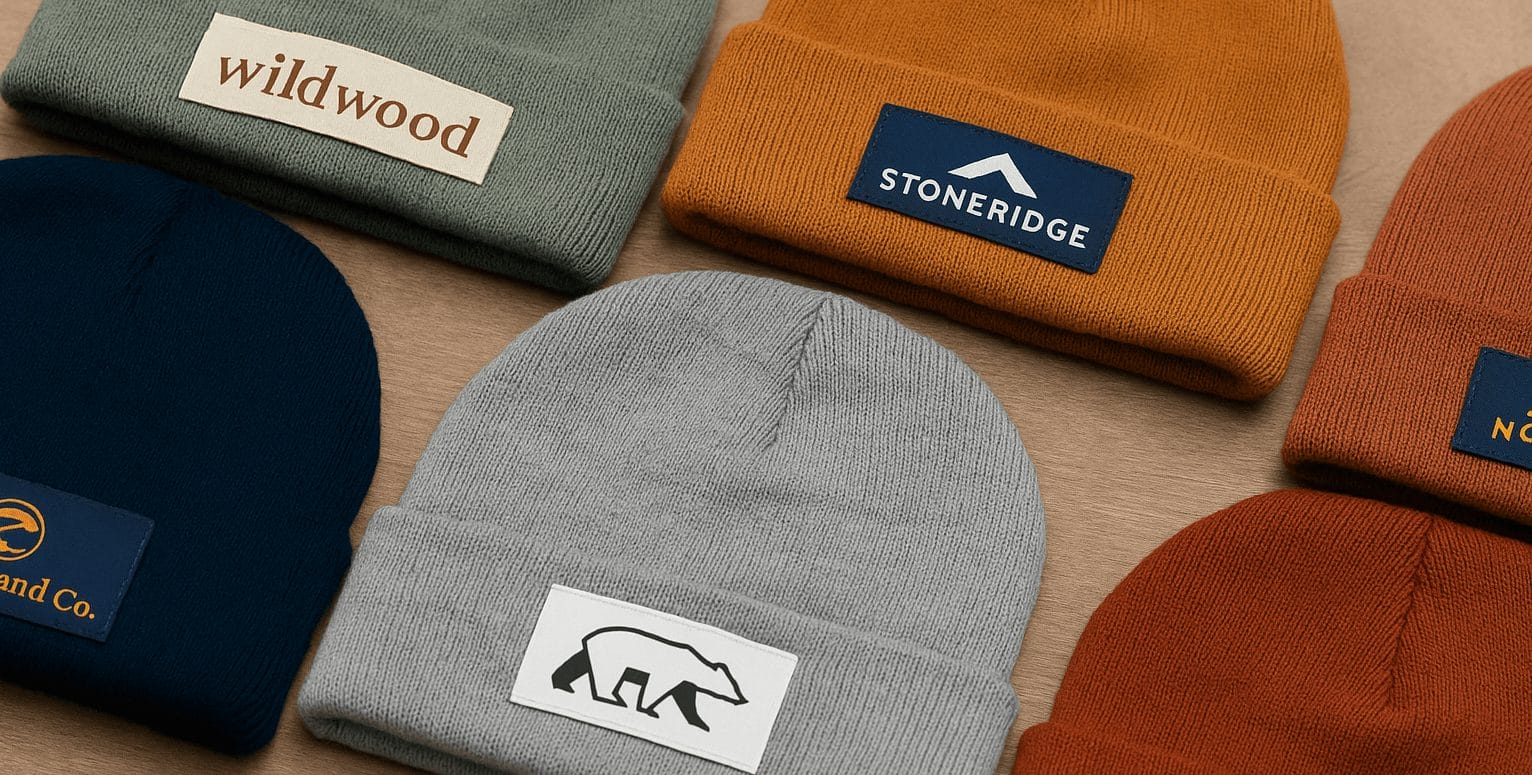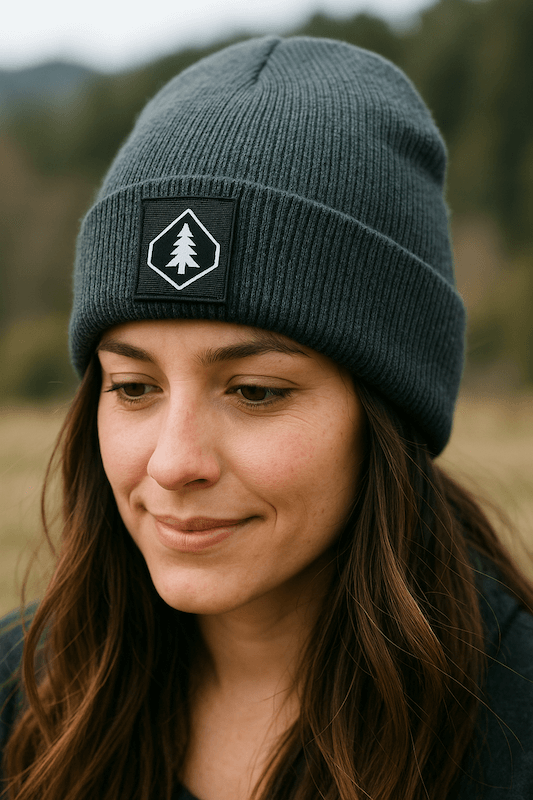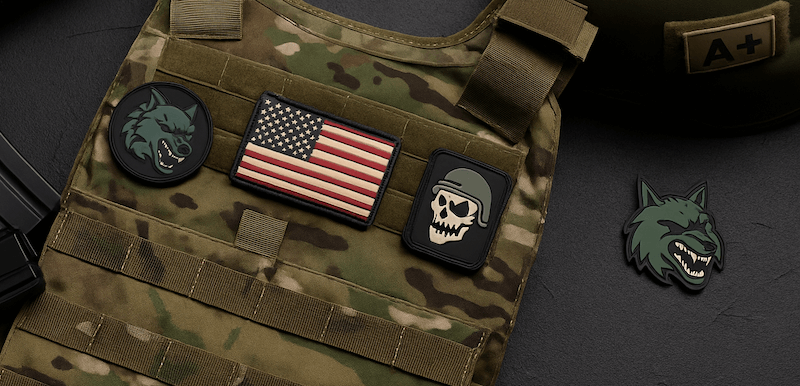Is Polyester Knit or Woven? (And Why It Matters for Labels)

If you’ve ever run your fingers across a tag inside a shirt and thought, “Is this polyester knit or woven?”—you’re asking the right question. That tiny label is more than just a size marker. It’s branding. It’s durability. It’s comfort. And it all starts with understanding how that polyester fabric is made.
Whether you’re creating custom labels for your merch, fashion line, or company swag, choosing between knit and woven polyester can make or break your final look. Let’s break it all down—no fabric degree required.
Polyester Fabric 101 for Labels
Polyester fibers are made through a process involving ethylene glycol and terephthalic acid (or sometimes recycled plastic bottles—yes, really). The result? A strong synthetic fiber called polyethylene terephthalate.
But here’s where it gets interesting: depending on the manufacturing process, polyester yarns can be either knit or woven—and that choice totally changes how a label performs.
When you’re deciding on a custom label, understanding this difference helps you choose the right texture, durability, and look for your brand.
Polyester Labels: Knit vs Woven
Let’s finally answer the question: is polyester knit or woven?
It’s both—depending on how it’s constructed. Here’s what each means for labels and custom branding.
Woven Polyester Labels
Woven polyester labels are made by weaving warp threads and weft threads at right angles—much like a tiny textile on its own. It’s durable, has clean edges, and offers sharp detail in logos and text. Our most popular polyester blended label is a customized dye-sublimated label, which includes full colors printing over the polyester material.
- ✓ Perfect for: Clothing tags, high-end custom labels, and custom woven label branding
- ✓ Fabric feel: Structured, with little stretch
- ✓ Visual: Crisp graphics, long-lasting text
- ✓ Bonus: Often has wrinkle resistance and works well with plain weave fabric
Knit Polyester Labels
Polyester knit fabric for labels is made by looping threads (called weft yarns) into soft, flexible surfaces. Think comfort over structure.
- Perfect for: Seamless interior labels, stretchy garments, soft branding
- Fabric feel: Flexible and soft
- Visual: Smoother, but less precise for small text
- Bonus: Great for activewear and polo shirts that need a label that moves with the fabric
Different Types of Knit Label
Not all knits are created equal. If you’re leaning toward a polyester knit fabric for your label, here’s a quick guide to common types:
Jersey Knit
Soft and lightweight, jersey knit is often used in T-shirts. In labels, it provides a comfy touch—ideal for direct-to-skin tags.
Rib Knit
Used in cuffs and collars, rib knit is stretchy and textured. For labels, it offers flexibility and can be paired with lycra blends.
Double-Knit
Need something sturdier? Double-knit labels use two yarn systems, offering more durability while still feeling soft.

Tricot Knit
Tricot labels have a smooth finish and are made using warp knitting. Great for silky linings or cold-weather gear.
Weft Knits
Most knitted fabric used in labeling falls under this type. Easy to manufacture and great for flexibility.
Woven Polyester Label Fabrics
Woven labels are the industry standard for high-quality branding. Here are the top choices:
Plain Weave Fabric
Plain weave technique offers a tight, flat surface—perfect for small text and sharp logos. Common in premium custom labels.
Twill Weave
A twill weave features a subtle diagonal pattern. It’s strong, stylish, and has a textured look—ideal for brand-forward outerwear labels.
Comparing Natural and Synthetic Label Options
Choosing between natural fabric and synthetic materials like polyester depends on your product and aesthetic goals.
Natural Fibers for Labels
Cotton fabric and other natural fibers offer softness but wear out quicker and may fade or wrinkle.
Synthetic Fabrics for Labels
Polyester labels last longer, resist fraying, and handle more washes—making them a popular choice for product development and branding.
Cotton/Lycra Label Blends
Blends like cotton/lycra or polyester/lycra knits offer a mix of comfort and strength, especially useful for basic fabrics like tees and hoodies.
The Label Manufacturing Process (Simplified)
Here’s how your label goes from fiber to final product:
- Synthetic fiber is made from terephthalic acid and ethylene glycol
- It’s turned into polyester yarns
- The yarns are knit or woven, depending on your label type
- Designs are created, often with a digital loom or Sewing Pattern
- The label is trimmed, inspected, and applied using a sewing machine or adhesive backing
Choosing the Right Custom Label Fabric
How do you pick between woven polyester and polyester knit fabric for your label?
- Use woven polyester for clean, professional brand labels
- Use knit polyester for soft, flexible designs that prioritize comfort
- Add nylon spandex or spandex blend for garments that stretch
- Choose lycra knits for activewear or leggings
Want eco-friendly? Many polyester options now use recycled plastic bottles without sacrificing quality.
FAQs: Polyester Labels Edition
Are polyester labels itchy?
Only if you pick the wrong weave! Go for soft knitted fabric or jersey knit for direct skin contact.
What type of label lasts the longest?
Woven polyester with twill weave or plain weave fabric resists fraying and fading, making it a great long-term solution.
Can I use knit labels for outerwear?
You can, but woven labels will generally hold their shape better and display fine detail more clearly.
Final Stitch: Polyester Labels Done Right
So… is polyester knit or woven? For labels, it can be either—and that’s the beauty of it. Whether you want sharp, professional woven labels, or soft, stretchy knit tags, polyester’s versatility means there’s always a kind of fabric that fits your vision.
At The Monterey Company, we help you pick the right fabrics, structure, and style for your next line of custom labels. Need help choosing? Fill out our quote request form to connect to our talented sales team. We are here to help.
Eric Turney
Eric Turney A devoted father, football fanatic, and stand-up comedy enthusiast who loves nothing more than bringing people together over great food and a good time. When he’s not cheering on his favorite team or experimenting in the kitchen, you can find him connecting with others on LinkedIn


